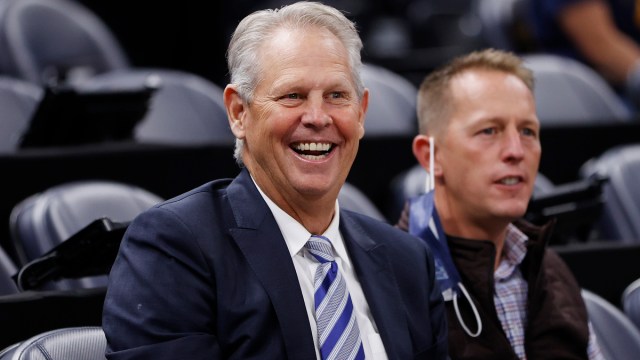Tom Brady’s “Man in the Arena” docuseries offers a new perspective on each of the quarterback’s Super Bowl seasons. Episode 6 focuses on the 2014 campaign, which began with the New England Patriots drafting who they believed would be his successor, Jimmy Garoppolo.
Shortly after the Patriots selected Garoppolo in the second round — the earliest they’d drafted a QB since Drew Bledsoe — head coach Bill Belichick referenced Brady’s “age and contract status.”
According to Brady, those comments, more than the Garoppolo pick itself, rubbed him the wrong way.
“We drafted Jimmy, and I just thought just like any other time, you embrace him and they’re your teammate,” Brady says in the latest “Man in the Arena” episode, which premieres next Tuesday on ESPN+.
“… Now, we drafted Jimmy higher. Coach Belichick referenced my age to me, referenced it to media. In my mind, I was thinking, ‘What are you talking about?’ I think he was just referencing, well, not many quarterbacks have ever played and been successful late in their career, and that’s just a fact. Of course, for me, I was just like, I don’t care about any of those things.”
Brady was 36 at the time, nearing the typical expiration date for most quarterbacks. He also was coming off a less-than-stellar 2013 season by his lofty standards. But he did not view himself as a declining player — an accurate assessment, as the NFL quickly discovered — and believed the Patriots weren’t reciprocating his commitment to the franchise.
“From the team standpoint, again, you’re always looking to: what’s going to happen if Tom retires? What’s going to happen if Tom isn’t the player he is?” Brady says, “I never thought about those things, because I didn’t think of myself as aging in a traditional way. I was really beginning to understand how to take care of myself. I was really beginning to understand the game, how to study, how to be more efficient. I was really beginning to understand how to train, how to communicate more effectively with my teammates.
“Things were maturing in my life. … We built a home (outside Boston) that got finished in 2014. Like, this is where we’re going to be. I really felt like I was giving my heart to the team, the city. I felt like I was setting down my roots because I had committed to be in Boston, and I didn’t necessarily feel like, oh, that’s reciprocated. But I recognize that I’m no different than those other positions on the team. I’ve still got to go out there and perform at a high level and earn my job.”
New England fans know how that 2014 season played out.
Brady and the Patriots struggled early, then, after a panic-button loss to the Kansas City Chiefs in Week 4, blitzed through the final three-quarters of their schedule to finish 12-4. They proceeded to beat the Baltimore Ravens and Indianapolis Colts in the playoffs and took down the Seattle Seahawks in one of the greatest Super Bowls ever played to end a decade-long championship drought.
Brady wound up outlasting Garoppolo, whom Belichick begrudgingly traded to San Francisco in 2017, and went on to win two additional Super Bowls with New England.
That ’14 playoff run also birthed the monster that was Deflategate. “Man in the Arena” addresses that years-long saga, but only briefly, giving it about three minutes of screen time before shifting its focus to the Super Bowl itself.
“I think the next morning is when I heard about it,” Brady says, intercut with scenes from his surreal first post-Deflategate news conference. “… I didn’t know what was going on, I didn’t know what they were talking about, so I kind of just laughed it off. … I think everyone was trying to figure out exactly what was happening, obviously what we were being accused of doing. … I just remember walking in (to the podium), and there was different cameras there than ever before. This was not a football story anymore. … When you’re being accused of something, first of all, you’re trying to figure out exactly what happened yourself.”
Brady chalks up the controversy, which ultimately ended with him being suspended for the first four games of the 2016 season and the Patriots losing two draft picks, to “negativity” directed at him and his team.
“We’d accomplished so much as a team, and here we are talking about something that we didn’t know much about at the time,” he says. “All it is is negativity and people trying to take us down, and I think that part was familiar. … People don’t want to believe there was great, positive things behind what we had achieved. I think people want to believe that there’s always shortcuts to take and so forth. So I think everybody was just trying to answer what we could answer and move on so that you could really focus on the preparation for the Super Bowl.”
Episode 6 of “Man in the Arena,” a co-production by ESPN, Religion of Sports, 199 Productions and NFL Films, premieres next Tuesday at 9 p.m. ET on ESPN+.







